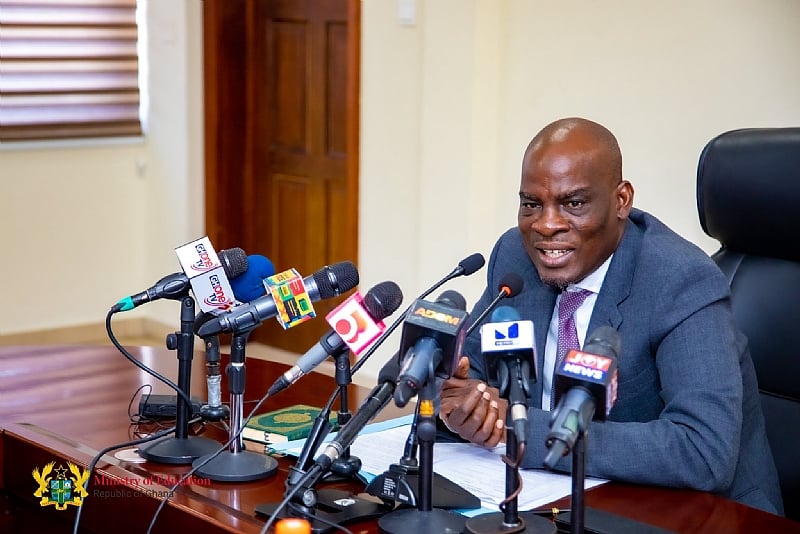Ghana’s Minister of Education, Haruna Iddrisu, delivered a mid-year report on the progress of President John Dramani Mahama’s educational reforms, painting a picture of a dynamic and evolving educational landscape. The briefing, held at Jubilee House on June 18, 2025, touched upon six key areas of development designed to broaden access, improve quality, and ensure inclusivity within the education system. From the integration of public feedback to innovative digital platforms and significant financial commitments, the reforms aim to address critical challenges and position Ghana for a future driven by knowledge and innovation. The Minister’s report signaled a strong commitment to transforming education into a driving force for national development.
Central to the ongoing reforms is the extensive public consultation process. The recently concluded National Education Forum yielded over 2,000 proposals from stakeholders nationwide, offering diverse perspectives on the challenges and opportunities facing the education sector. This wealth of input, according to Minister Iddrisu, forms the bedrock of the Ministry’s long-term strategic planning, ensuring that the reforms are responsive to the needs and aspirations of the Ghanaian people. Incorporating this feedback is crucial for creating an education system that is truly representative and effective. This demonstrates a commitment to collaborative policymaking, recognizing the importance of diverse voices in shaping the future of education.
Access to tertiary education received a significant boost with the launch of the No-Fee-Stress digital platform. This innovative portal streamlines applications and financial aid processes, simplifying access for prospective students. With 129,000 students already utilizing the platform, it has proven instrumental in removing financial and bureaucratic hurdles, promoting transparency, and increasing access to higher education. The platform represents a significant stride towards ensuring that financial constraints do not prevent qualified students from pursuing their academic aspirations. This digital solution underscores the government’s commitment to leveraging technology to modernize and improve efficiency within the education sector.
Inclusivity is a cornerstone of the government’s education agenda, with specific measures designed to support vulnerable populations. A dedicated allocation of GHS 7 million has been earmarked to cover tuition fees for tertiary students with disabilities. This financial assistance signifies more than just monetary support; it represents a fundamental commitment to ensuring equal opportunities for all learners, regardless of their physical limitations. This initiative underscores the government’s recognition of the importance of creating an inclusive learning environment that caters to the diverse needs of all students. By removing financial barriers, the initiative empowers students with disabilities to pursue their educational goals and contribute meaningfully to society.
The government’s commitment to menstrual hygiene and local production is evident in its approach to the Free Sanitary Pad policy. Minister Iddrisu emphasized that all sanitary pads distributed under this program will be sourced domestically, prohibiting imports. This commitment to local production not only supports public health but also stimulates economic growth by creating jobs and fostering local industries. Furthermore, a proposal to establish a sanitary pad production unit within the Prisons Service is under consideration. This innovative approach seeks to combine public health initiatives with skills development and rehabilitation programs within the correctional system.
Addressing concerns about student nutrition, Minister Iddrisu confirmed the release of GHS 600 million over the past six months to sustain feeding programs in Senior High Schools nationwide. This substantial investment underscores the government’s prioritization of student well-being, recognizing that proper nutrition is essential for academic performance and overall development. By ensuring that students have access to nutritious meals, the government aims to create a conducive learning environment and improve educational outcomes. This commitment reinforces the government’s dedication to supporting the holistic development of students, recognizing the crucial link between nutrition and academic success.
The government’s investment in research and innovation is evident in the establishment of a National Research Fund. Seeded with GHS 50 million from the GETFund, this fund will support critical research projects across universities nationwide. This initiative aims to bolster Ghana’s knowledge economy, fostering innovation and driving progress in various fields. The establishment of this fund highlights the government’s recognition of the vital role of research in national development and its commitment to creating an environment that fosters intellectual inquiry and innovation. By investing in research, the government aims to position Ghana as a leader in knowledge creation and technological advancement.
In conclusion, Minister Iddrisu’s mid-year briefing presented a comprehensive overview of the ongoing educational reforms in Ghana. From fostering inclusive learning environments to promoting local production and investing in research, the initiatives undertaken by the government demonstrate a strong commitment to transforming the education sector. The reforms aim to address critical challenges, expand access to quality education, and equip learners with the skills and knowledge necessary to thrive in a rapidly changing world. These efforts, driven by collaboration and innovation, underscore the government’s dedication to building a robust and future-ready education system that serves as a catalyst for national development. The reforms represent a comprehensive approach to education, addressing issues from basic needs like nutrition and hygiene to higher-level concerns of research and tertiary access. This holistic strategy signals a commitment to fostering a thriving education system that benefits all learners and contributes to Ghana’s overall progress.


